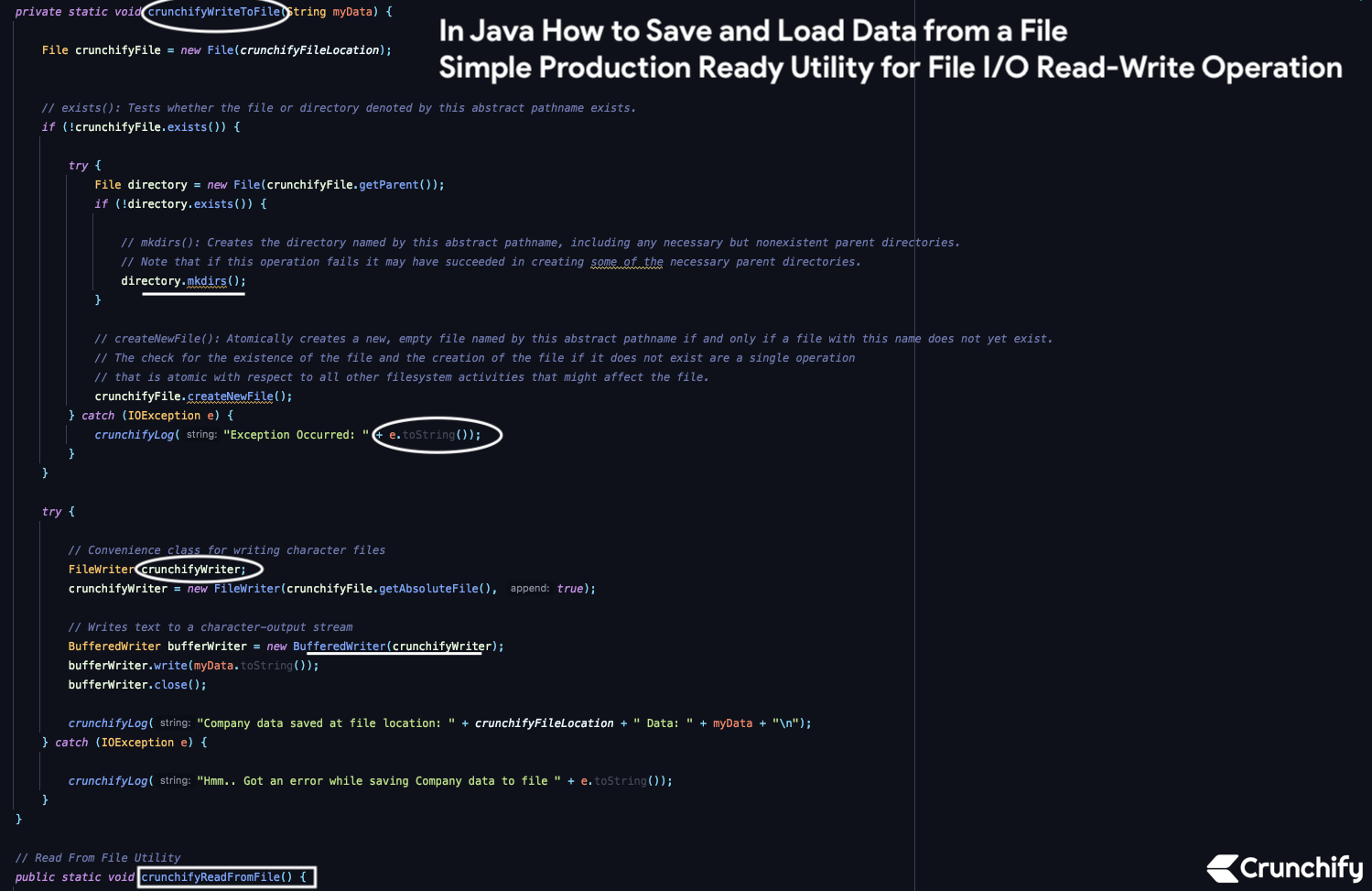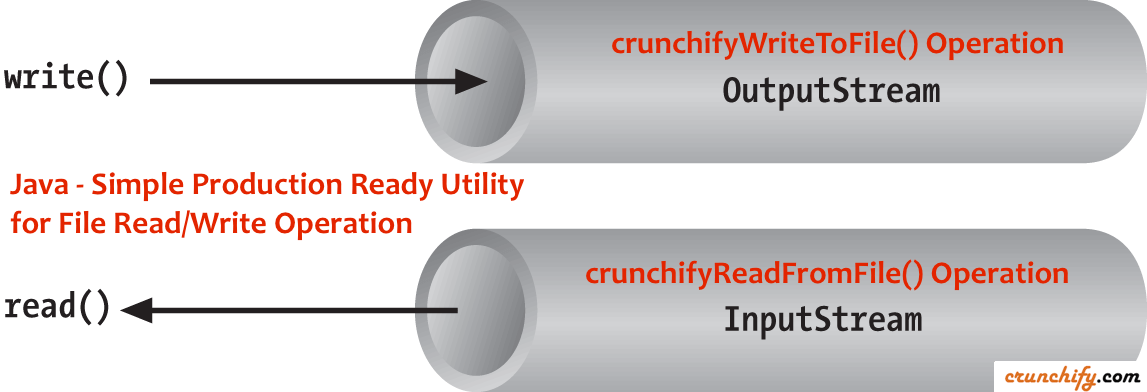Javaの場合ファイルからデータを保存およびロードする方法–ファイルI / O読み取り/書き込み操作用のシンプルなProductionReadyユーティリティ
公開: 2020-10-11
オブジェクトをファイルに書き込んで読み戻すにはどうすればよいですか?
Javaは多くのAPIで非常に優れており、Java 8では、Lambda、メソッド参照、デフォルトメソッド、より優れたタイプインターフェイス、繰り返しアノテーション、メソッドパラメーターリフレクションなどのAPIが完全に有効になっています。
しばらく前に、JavaでファイルからJSONオブジェクトを読み取る方法に関する記事を書きました。 単純なJava読み取り操作でした。 ただし、このチュートリアルでは、単純なProduction ReadyJavaユーティリティを使用してファイルからデータをsave and loadします。

単純なオブジェクトを保存するだけでなく、CrunchifyCompany型の単純なJava POJOを作成し、 GSONを使用してオブジェクトを保存および取得します。 以下のプログラムを実行するには、以下の依存関係が必要です。
以下にMavenプロジェクトへの依存関係を配置します。 動的Webプロジェクトがあり、それをMavenプロジェクトに変換する場合は、次の手順に従います。
|
1 2 3 4 5 |
< dependency > < groupId > com . google . code . gson < / groupId > < artifactId > gson < / artifactId > < version > 2.3 < / version > < / dependency > |
フローは次のとおりです。
- クラス
CrunchifyReadWriteUtilityForFile.java作成します - 2つのフィールドを持つプライベート内部クラス
CrunchifyCompanyを作成します- プライベートint
employees; - プライベート文字列
companyName;
- プライベートint
- mainメソッド内にオブジェクト
crunchifyを作成します - オブジェクトを
Gsonに変換して、ファイルに保存します - メソッド
crunchifyWriteToFileを使用して、Javaでデータをファイルに保存します - メソッド
crunchifyReadFromFileを使用して、Javaのファイルからデータを取得します
完全な例を次に示します。
|
1 2 3 4 5 6 7 8 9 10 11 12 13 14 15 16 17 18 19 20 21 22 23 24 25 26 27 28 29 30 31 32 33 34 35 36 37 38 39 40 41 42 43 44 45 46 47 48 49 50 51 52 53 54 55 56 57 58 59 60 61 62 63 64 65 66 67 68 69 70 71 72 73 74 75 76 77 78 79 80 81 82 83 84 85 86 87 88 89 90 91 92 93 94 95 96 97 98 99 100 101 102 103 104 105 106 107 108 109 110 111 112 113 114 115 116 117 118 119 120 121 122 123 124 125 126 127 128 129 130 131 132 133 134 135 136 137 138 139 |
package crunchify . com . tutorial ; import com . google . gson . Gson ; import com . google . gson . stream . JsonReader ; import java . io . * ; import java . nio . charset . StandardCharsets ; /** * @author Crunchify.com * Best and simple Production ready utility to save/load * (read/write) data from/to file */ public class CrunchifyReadWriteUtilityForFile { private static final String crunchifyFileLocation = "/Users/appshah/Documents/crunchify.txt" ; private static final Gson gson = new Gson ( ) ; // CrunchifyComapny Class with two fields // - Employees // - CompanyName private static class CrunchifyCompany { private int employees ; private String companyName ; public int getEmployees ( ) { return employees ; } public void setEmployees ( int employees ) { this . employees = employees ; } public String getCompanyName ( ) { return companyName ; } public void setCompanyName ( String companyName ) { this . companyName = companyName ; } } // Main Method public static void main ( String [ ] args ) { CrunchifyCompany crunchify = new CrunchifyCompany ( ) ; crunchify . setCompanyName ( "Crunchify.com" ) ; crunchify . setEmployees ( 4 ) ; // Save data to file crunchifyWriteToFile ( gson . toJson ( crunchify ) ) ; // Retrieve data from file crunchifyReadFromFile ( ) ; } // Save to file Utility private static void crunchifyWriteToFile ( String myData ) { File crunchifyFile = new File ( crunchifyFileLocation ) ; // exists(): Tests whether the file or directory denoted by this abstract pathname exists. if ( ! crunchifyFile . exists ( ) ) { try { File directory = new File ( crunchifyFile . getParent ( ) ) ; if ( ! directory . exists ( ) ) { // mkdirs(): Creates the directory named by this abstract pathname, including any necessary but nonexistent parent directories. // Note that if this operation fails it may have succeeded in creating some of the necessary parent directories. directory . mkdirs ( ) ; } // createNewFile(): Atomically creates a new, empty file named by this abstract pathname if and only if a file with this name does not yet exist. // The check for the existence of the file and the creation of the file if it does not exist are a single operation // that is atomic with respect to all other filesystem activities that might affect the file. crunchifyFile . createNewFile ( ) ; } catch ( IOException e ) { crunchifyLog ( "Exception Occurred: " + e . toString ( ) ) ; } } try { // Convenience class for writing character files FileWriter crunchifyWriter ; crunchifyWriter = new FileWriter ( crunchifyFile . getAbsoluteFile ( ) , true ) ; // Writes text to a character-output stream BufferedWriter bufferWriter = new BufferedWriter ( crunchifyWriter ) ; bufferWriter . write ( myData . toString ( ) ) ; bufferWriter . close ( ) ; crunchifyLog ( "Company data saved at file location: " + crunchifyFileLocation + " Data: " + myData + "\n" ) ; } catch ( IOException e ) { crunchifyLog ( "Hmm.. Got an error while saving Company data to file " + e . toString ( ) ) ; } } // Read From File Utility public static void crunchifyReadFromFile ( ) { // File: An abstract representation of file and directory pathnames. // User interfaces and operating systems use system-dependent pathname strings to name files and directories. File crunchifyFile = new File ( crunchifyFileLocation ) ; if ( ! crunchifyFile . exists ( ) ) crunchifyLog ( "File doesn't exist" ) ; InputStreamReader isReader ; try { isReader = new InputStreamReader ( new FileInputStream ( crunchifyFile ) , StandardCharsets . UTF_8 ) ; JsonReader myReader = new JsonReader ( isReader ) ; CrunchifyCompany company = gson . fromJson ( myReader , CrunchifyCompany . class ) ; crunchifyLog ( "Company Name: " + company . getCompanyName ( ) ) ; int employee = company . getEmployees ( ) ; crunchifyLog ( "# of Employees: " + Integer . toString ( employee ) ) ; } catch ( Exception e ) { crunchifyLog ( "error load cache from file " + e . toString ( ) ) ; } crunchifyLog ( "\nCompany Data loaded successfully from file " + crunchifyFileLocation ) ; } private static void crunchifyLog ( String string ) { System . out . println ( string ) ; } } |
Eclipseコンソールの出力:
|
1 2 3 4 5 6 |
Company data saved at file location : / Users / appshah / Documents / crunchify . txt Data : { "employees" : 4 , "companyName" : "Crunchify.com" } Company Name : Crunchify . com # of Employees: 4 Company Data loaded successfully from file / Users / appshah / Documents / crunchify . txt |
これがcrunchify.txtファイルの内容です。
プログラムをtwo times実行すると、 crunchify.txtファイルに値を追加しているときにJSONObjectが2回表示されます。


